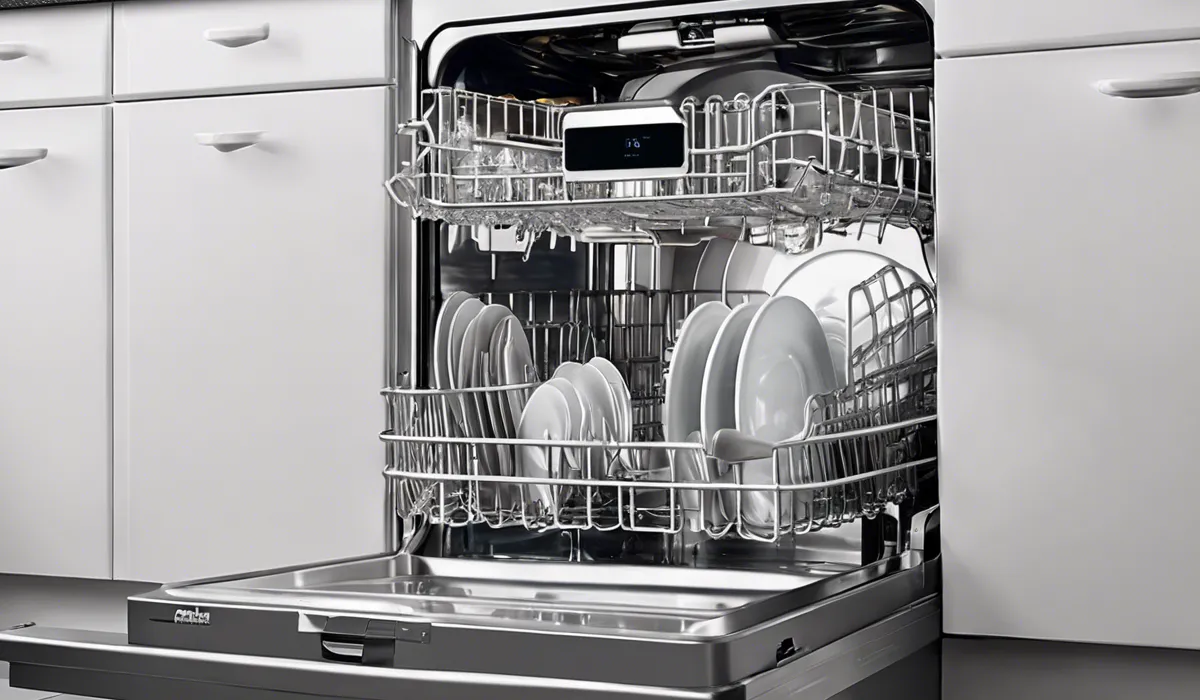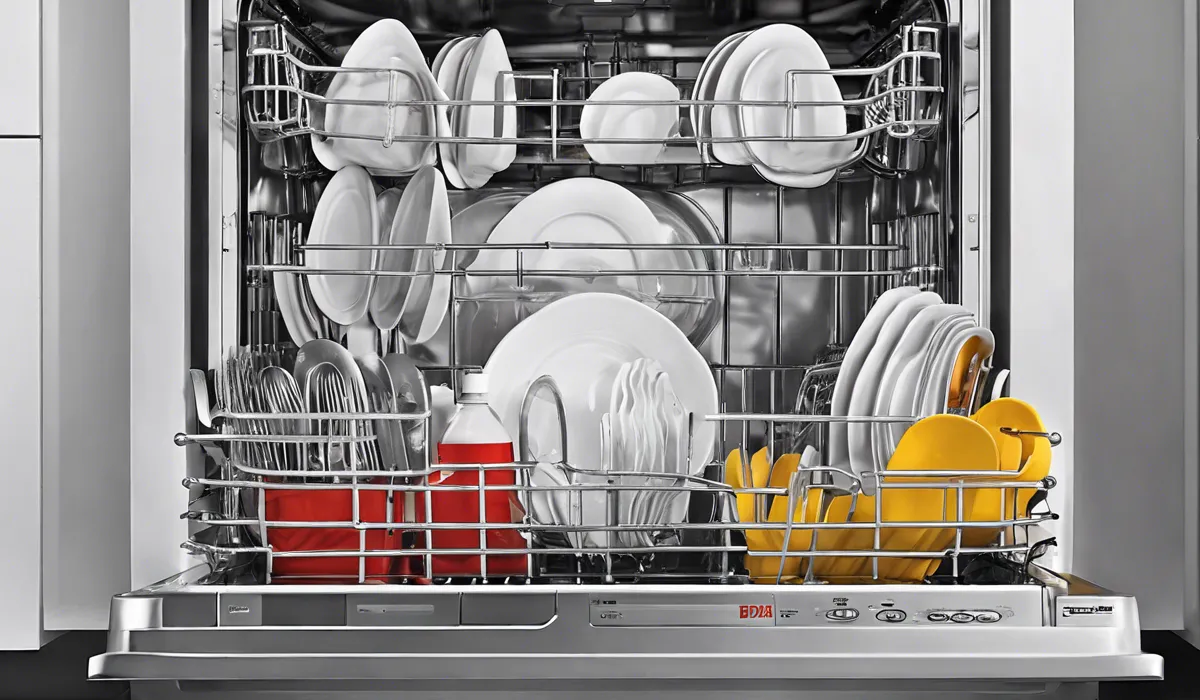How to Improve Dishwasher Performance: 5 Pro Tips
To enhance dishwasher performance, regularly clean the filter, use hot water, ensure proper loading patterns, and opt for high-quality detergent. Run hot water in the sink before starting the cycle to kickstart cleaning.
Proper Loading Techniques

Even Distribution of Dishes
For your dishwasher to perform at its best, it’s crucial to start with how you load it. Distributing dishes evenly across the racks ensures that each item gets adequate exposure to water and detergent.
This means placing large items like pots and pans on the sides or back, while smaller items like cups and bowls go on the top rack.
By balancing the load, you prevent the machine from becoming unsteady, which could otherwise lead to inefficient cleaning and potential damage.
Preventing Overcrowding
Resist the temptation to cram in just one more dish. Overcrowding can block water and detergent from reaching all surfaces, leaving you with food residue on your dishes after a cycle.
It’s better to run an additional cycle than to overload the machine. Each dish should have some space around it to allow water and detergent to circulate properly.
Adhering to Manufacturer Guidelines
Your dishwasher manual isn’t just for troubleshooting; it contains valuable information on the recommended loading pattern.
Each model has its own design, and following these guidelines will help maximize the cleaning power of your machine. Check the manual for specific instructions on where to place larger items, silverware, and delicate glassware.
Ensuring Spray Arm Movement
The water spray arms are the lifeline of your dishwasher. Before starting a cycle, ensure that there’s nothing obstructing their rotation.
This is often overlooked but can be the difference between spotless and spotty results. Large utensils or dish handles sticking out from the rack can block the arms, so tuck these away securely.
Strategic Placement of Soiled Items
Items with baked-on or dried food should be positioned so that the water jets can attack the mess directly.
This typically means facing the soiled side downward and toward the center where the spray is strongest. If necessary, pre-rinse these items, especially if you’re not running the dishwasher immediately.
Pre-Rinse Considerations
While modern dishwashers are designed to handle food residue, pre-rinsing can sometimes be beneficial.
If you’re dealing with heavily soiled items or not running the dishwasher right away, a quick rinse can prevent food from hardening and becoming more difficult to remove. Just remember that excessive pre-rinsing is often unnecessary and can waste water.
Regular Cleaning and Maintenance

Filter Cleaning Routine
One of the most important maintenance tasks for improving dishwasher performance is regularly cleaning the filter. A clogged filter restricts water flow and reduces cleaning efficiency.
Most dishwashers have removable filters that should be checked and cleaned at least once a month, depending on usage. This simple task can make a big difference in how well your machine cleans.
Spray Arm Upkeep
The spray arms can get clogged with food particles and mineral deposits, leading to poor water distribution during cycles.
Inspect and clean the holes in the spray arms with a toothpick or small brush to ensure they can dispense water effectively. Do this every few months or whenever you notice a decrease in cleaning performance.
Door Seal Maintenance
The door seal can accumulate grime, leading to leaks and heat loss. Wipe down the edges and seals with a damp cloth regularly to maintain a tight seal and prevent water from escaping during a cycle.
This not only helps with performance but also extends the lifespan of the seal.
Detergent Dispenser Care
A clean detergent dispenser ensures that the right amount of cleaning agent is released at the correct time.
Check it often for residue and clean it with a damp cloth to keep it functioning properly. This will help you avoid issues with undissolved detergent that can leave a film on dishes.
Deodorizing and Descaling
Over time, your dishwasher may begin to emit unpleasant odors and accumulate mineral deposits, especially in hard water areas.
Running an empty cycle with vinegar or using a dishwasher cleaner can help deodorize and remove these deposits. Aim to do this every couple of months to keep your dishwasher smelling fresh and working efficiently.
Optimizing Detergent and Cycle Settings

Selecting the Right Detergent
The type of detergent you use should be compatible with the hardness of your water. Hard water requires a detergent with water softening agents to prevent mineral buildup and ensure dishes come out clean.
Soft water, on the other hand, requires less detergent. You can find out your water hardness and get the right detergent accordingly.
Proper Detergent Dosage
Using too much or too little detergent can negatively impact cleaning performance.
Follow the manufacturer’s recommendations for the right amount based on your water hardness and load size. This will help you avoid residue on dishes and ensure that they come out sparkling clean.
The Role of Rinse Aids
Rinse aids can greatly improve drying by causing water to sheet off dishes rather than form droplets that leave spots.
They are especially helpful in areas with hard water. If you’re noticing that your dishes aren’t completely dry at the end of a cycle, adding rinse aid might be the solution.
Choosing the Appropriate Wash Cycle
Dishwashers come with various cycle options, each designed for different types of loads. Selecting the most appropriate wash cycle is essential for both cleaning performance and energy efficiency.
Use a heavier cycle for very dirty dishes and a lighter one for less soiled items. Paying attention to the cycle settings can lead to better cleaning results and lower utility bills.
Energy-Efficient and Eco-Friendly Options
Modern dishwashers often come with energy-efficient and eco-friendly cycles. These cycles use less water and energy, which is good for the environment and your wallet.
Evaluate whether these settings are suitable for your load and consider using them whenever possible to conserve resources while still getting your dishes clean.
FAQs About Improving Dishwasher Performance
How often should I clean my dishwasher filter to maintain performance?
Regularly clean your dishwasher filter, ideally once a month, to maintain optimal performance.
Does hot water improve dishwasher cleaning efficiency?
Yes, using hot water can significantly enhance dishwasher cleaning efficiency and help dissolve grease and food particles more effectively.
What is the proper way to load a dishwasher to improve cleaning?
Ensure proper loading by placing dishes facing the center sprayer arms, avoiding overcrowding, and separating items to allow water to circulate freely.
How does the quality of dishwasher detergent affect performance?
High-quality detergent can make a significant difference in cleaning performance, leading to fewer spots and residues on dishes.
Why should I run hot water in the sink before starting the dishwasher?
Running hot water in the sink before starting the cycle helps to ensure the water entering the dishwasher is immediately hot, kickstarting the cleaning process.
Final Thoughts
To optimize dishwasher efficiency, maintain a clean filter, utilize hot water, load dishes correctly, and choose quality detergent. Starting with hot water from the sink before the cycle can improve cleaning efficacy, ensuring your dishwasher operates at its best.





